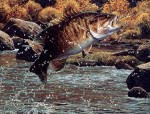Loons normally arrive back at the river in April or May. While loons generally mate with the same partner for life, they do not travel together. The male and female will arrive at the river separately but shortly after arriving, they will start to build their nest together. Because of their ineptness on land, they will nest as close to the water as possible often close to a bank with a drop off which allows them to get to the nest from underwater. Needless to say, islands make the perfect location for loons to nest. Nests are made of twigs, marsh grasses, reeds, other dead plants, and mud so they can slip on and off the nest easily and quietly without being seen by predators. They will form the bulky nest into a mound, usually less than two feet in width, and shape the interior to fit its body. Like many of our river aquatic bird species, loons will often reuse the same nest over the next several years just fixing it up each spring rather than building a new one.
The female loon lays anywhere from one to three olive colored eggs with dark spots. Both parents will incubate the eggs over the next month (28-30 days). Once they hatch, the chicks will leave the nest within 24 hours. Though they are already able to swim, they will often be seen riding on their parents’ backs for the first few weeks. The parents will continue to feed them for the first eight weeks or so as they learn to dive and fish for themselves. By about 12 weeks they are able to fly and be independent of their parents.
In the fall, the parents will head south first, leaving the young loons to gather into flocks and make their own journey south a few weeks later. Hence, it is not usual to see multiple loons on the river in late September. The young loons will remain down south for several years. They will start to migrate in their third year but it is not until they are about six years old before they start breeding. The oldest-known loon lived for over 24 years.
The female loon lays anywhere from one to three olive colored eggs with dark spots. Both parents will incubate the eggs over the next month (28-30 days). Once they hatch, the chicks will leave the nest within 24 hours. Though they are already able to swim, they will often be seen riding on their parents’ backs for the first few weeks. The parents will continue to feed them for the first eight weeks or so as they learn to dive and fish for themselves. By about 12 weeks they are able to fly and be independent of their parents.
In the fall, the parents will head south first, leaving the young loons to gather into flocks and make their own journey south a few weeks later. Hence, it is not usual to see multiple loons on the river in late September. The young loons will remain down south for several years. They will start to migrate in their third year but it is not until they are about six years old before they start breeding. The oldest-known loon lived for over 24 years.





No comments:
Post a Comment